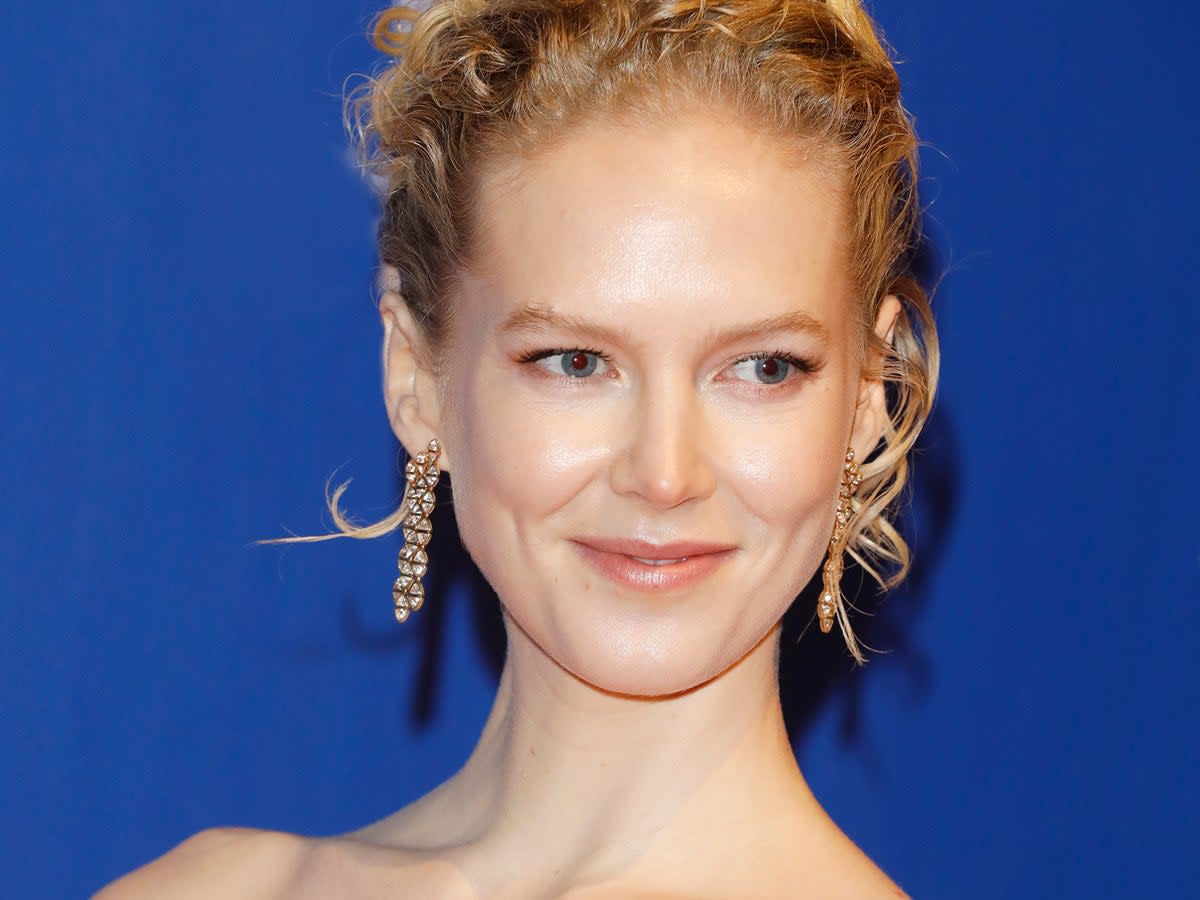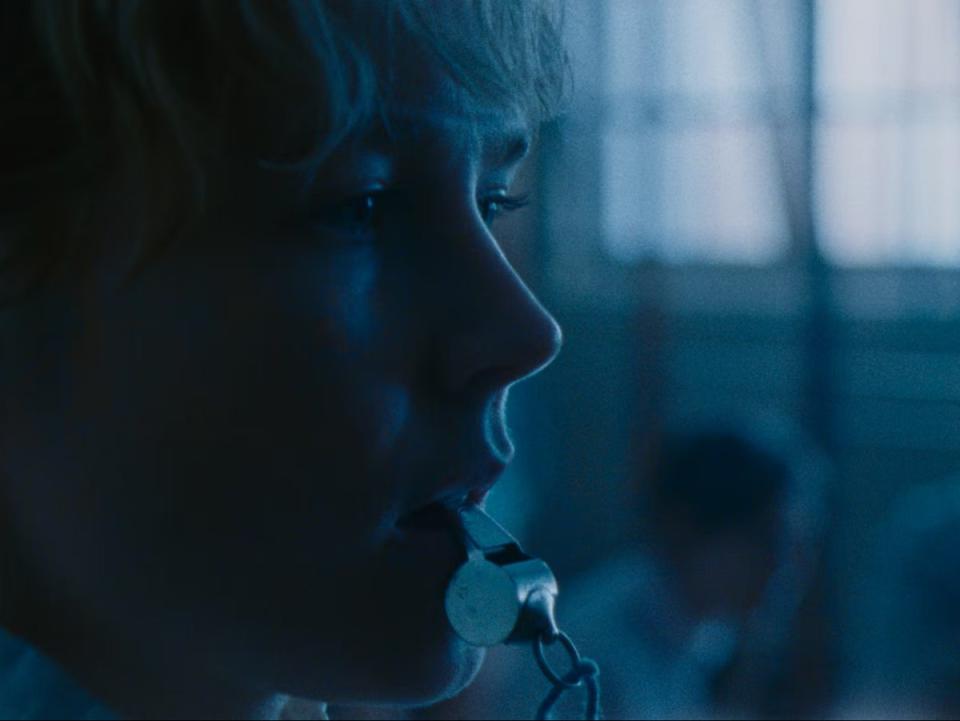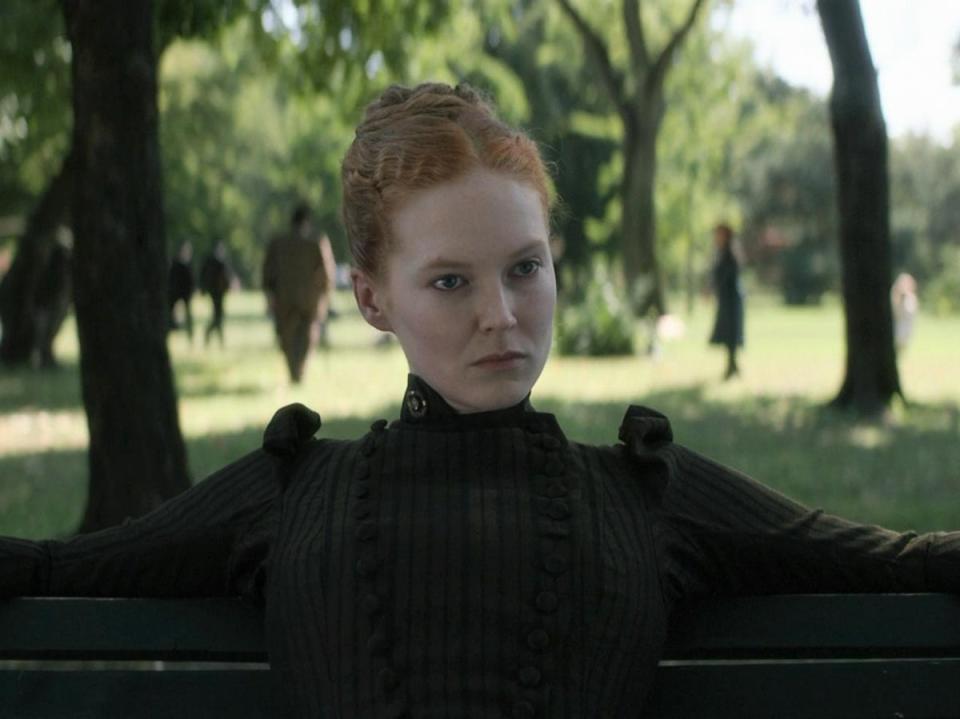‘People’s fear levels were sky-high’: Rosy McEwen on how Section 28 drama Blue Jean is breaking the mould for lesbians on screen

When Rosy McEwen was filming the Eighties-set lesbian drama Blue Jean, something strange started happening in the middle of the night. “I’d wake up and burst into tears,” says the actor, her icy blue eyes wide at the memory. “My breathing would start to go and I’d just sob uncontrollably. It happened a few times, and I didn’t even feel sad. There was just something that needed to come out.”
McEwen’s feelings were quite literally spilling out of her because, for every day of the three-month shoot, she was pushing down all the fear and frustration felt by her character Jean, a gay PE teacher working in the time of Section 28. The law was brought in under Thatcher in 1988 to “prohibit the promotion of homosexuality” in schools. It had a crippling effect on queer communities and effectively slammed the closet door on generations of LGBT+ people. “I’m not a method actor or anything,” says McEwen, “but I go in. And I was so exhausted. The level of fear that Jean must have felt, from even the tiniest interactions... In normal life, if you’re upset, you just cry and experience it. But with Jean, it’s all forced away. I was trying to replicate that for a few months, so how people lived that life, for years, is beyond me.”
On screen, the result of McEwen’s commitment is flat-out tremendous. Against the evocative backdrop of 1980s Newcastle, between squeaky gym floors and smoky gay clubs, the actor quietly displays the battle between Jean’s confusion and shame, and her determination to be herself. She’s too gay to show her true colours at school, but not gay enough for her liberated girlfriend Viv (Kerrie Hayes).
The film is one of the few about gay women that was written and produced by lesbians, and McEwen – who doesn’t discuss her own sexuality – believes it’s breaking new ground. “A lot of lesbian films are about desire,” the 29-year-old tells me, as we walk loops around her local London park. “They’re wistful, and they’re about longing. But you don’t really see two gay women in a couple who happen to be gay, and I think that’s rare and something I’m proud to be a part of.”
Blue Jean avoids stereotypical depictions of lesbians – there are no long-haired beauties or women with no dress sense here. In this world, they don’t conform to a certain aesthetic, but they are undeniably very cool. The film shares its title with the 1984 Bowie song, and Jean has his androgyny and poise. Viv, meanwhile, has a shaved head, a nipple tattoo and is clad head-to-toe in leather. It’s the feature debut from writer Georgia Oakley, and is McEwen’s first lead film role, too. But in practically every review of McEwen’s work so far – from serial killer series The Alienist to the National Theatre’s Othello – she’s the one who critics can’t rip their eyes away from. At the British Independent Film Awards in December, McEwen took home the prize for Best Lead Performance for Blue Jean, fending off competition from Florence Pugh and Bill Nighy, among others.
McEwen and I meet on a crisp January day, her short blonde waves poking out from under her grey woolly hat. Petite and nimble, with a soft, quick voice, she is almost sprite-like. She seems composed and confident, but tells me that she suggested a walk because “it’s really hard to talk about yourself for so long” across a table. When I tell her I’ve seen she’s been compared by critics to both Nicole Kidman and Rosamund Pike, she nearly bursts. “Have I?!” she says, breathless. “Honestly, I’m thrilled with anything like that, I love them both.” Surely she’d read that herself? “No, I don’t read a lot because I’m very sensitive to it all.”
Despite being at school when Section 28 was abolished in 2003, McEwen didn’t know it existed until she was cast in Blue Jean. “Nothing was really said about it, it just got hidden under the carpet like a dirty shameful secret,” she says. The law’s sheer vagueness only added to its power. “It was confusing for teachers – what did ‘promotion of homosexuality’ mean?” asks McEwen. “Did it mean you couldn’t be gay? That you didn’t say you were gay? That you couldn’t just talk about it at all in class? Then when it was abolished, without clarification, teachers were probably still like, ‘Can I now be gay or talk about it?’ They didn’t know what it meant. It was so absurd and people’s fear levels were sky-high.”

“Hilariously,” she says, in a way that makes it clear she doesn’t find it funny at all, “there is very little about Section 28 on the internet. A few interviews are out there with men, but very few with lesbians.” While researching the role, McEwen was introduced to two lesbian netball teachers who’d lived Jean’s life. “The first thing one of the women said to me was, ‘I wish I’d been braver’,” says McEwen. “And you just felt how much she meant that. We’re all shouting at Jean, ‘Just f***ing say it! Be gay!’ But everything we’re shouting at her, she’s shouting at herself.”
Once she’d read everything she could find about Section 28, McEwen threw herself, peroxide-pixie-cut-first, into the role. To perfect Jean’s Geordie accent, Londoner McEwen watched hours of footage of former Girls Aloud star Cheryl. She says she can partly relate to Jean because, as a woman, she is always hiding a part of herself. “All the time,” she says. “There’s so much pressure to be a certain thing, whether it’s well-spoken or funny or beautiful. But we just want to exist and be free. It’s something I try to do every day, and it doesn’t always work.”
We all watch Love Island, and that can’t be good for us
In the film, Jean spends her nights after school watching Blind Date, the lucky-dip dating show with “a lorra lorra laughs” courtesy of host Cilla Black. Every episode hammers home heteronormative ideals and perpetuates stereotypes about femininity. “There are so many things like that, even from five or six years ago, which showed that if you were a woman you had to be feminine, and if you were a man you had to be masculine, and that’s where you were safe,” says McEwen. “Everything was painting that picture.” She laughs. “I mean, we all watch Love Island, and that can’t be good for us either.”
When Cilla Black quit Blind Date live on air in 2003, McEwen was just about to start at an all-girls Catholic secondary school in south London. “I didn’t wear makeup until I was like 18, didn’t have boobs until I was like 18 – I was just running around in my crop tops,” she says, flashing snow-white teeth as she smiles. She studied history of art in Leeds and, having enjoyed drama at school, finally took the plunge and did a play in her final year of university. She loved it so much that she ended up applying for theatre school, and got into Bristol Old Vic (the training ground of Olivia Colman and Daniel Day-Lewis).

From there, McEwen did theatre for a few years, spending some time at the Royal Shakespeare Company, and soon enough was offered her first screen role as a psychopathic child murderer in period drama The Alienist. “My parents watched it and they were like, ‘Who are you?’” she says, laughing. Next, she’s starring in the Rosemary’s Baby prequel, Apartment 7A, alongside Julia Garner. “I’m the bitchy one, which is so fun,” she says. “Villains are always the best. They’re so liberating to play.”
She’s made some shrewd early career choices but hasn’t always found it easy to decide between projects. She knows, though, that she’ll never regret doing Blue Jean. “If you pick the big shiny thing, and you’re on set in Timbuktu, being paid loads of money but not really that happy, then you’ve only got yourself to blame,” she says. “But if you’re freezing cold in Newcastle in January, and you love the part so much, then you have nothing to complain about at all.”
‘Blue Jean’ is in cinemas
‘Othello’ was filmed live on stage and will be available to watch in UK and Irish cinemas via National Theatre Live from 23 February